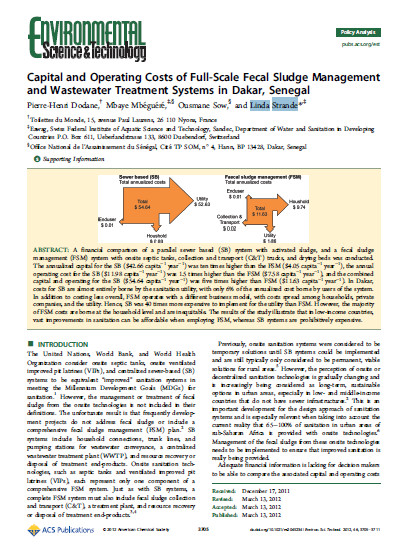Capital and Operating Costs of Full-Scale Fecal Sludge Management and Wastewater Treatment Systems in Dakar, Senegal
 |
position paper Mar 2012 ; 7 pages
Aut. Pierre-Henri Dodane & Mbaye Mbéguéré & Ousmane Sow & Linda Strande
Ed. ACS - Washington
Downloadable format: PdF
Downloadable from the publisher
Editor Presentation
Abstract:
A financial comparison of a parallel sewer based (SB) system with activated sludge, and a fecal sludge management (FSM) system with onsite septic tanks, collection and transport (C&T) trucks, and drying beds was conducted. The annualized capital for the SB ($42.66 capita–1 year–1) was ten times higher than the FSM ($4.05 capita–1 year–1), the annual operating cost for the SB ($11.98 capita–1 year–1) was 1.5 times higher than the FSM ($7.58 capita–1 year–1), and the combined capital and operating for the SB ($54.64 capita–1 year–1) was five times higher than FSM ($11.63 capita–1 year–1). In Dakar, costs for SB are almost entirely borne by the sanitation utility, with only 6% of the annualized cost borne by users of the system. In addition to costing less overall, FSM operates with a different business model, with costs spread among households, private companies, and the utility. Hence, SB was 40 times more expensive to implement for the utility than FSM. However, the majority of FSM costs are borne at the household level and are inequitable. The results of the study illustrate that in low-income countries, vast improvements in sanitation can be affordable when employing FSM, whereas SB systems are prohibitively expensive.
Keywords: |
costs, tariffs (CI) (DT) (ET) (ope) , sludge (CI) (DT) (ET) (ope) , sludge treatment (CI) (DT) (ET) (ope) , wastewater treatment (CI) (DT) (ET) (ope) |
Publisher/Broadcaster: |
|
ACS
-
American Chemical Society - Washington - Usa |
If there is a broken link, we will be pleased to receive a message: communication@pseau.org